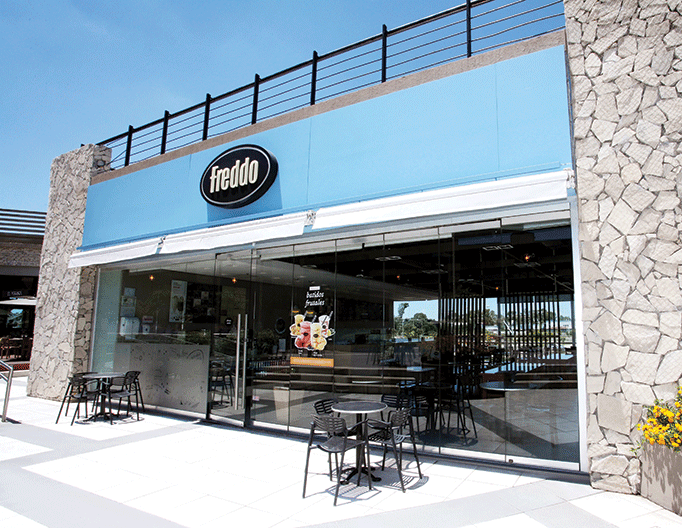
Freddo, Argentina’s top-selling premium ice-cream chain reached a major milestone this past August with the opening of its first U.S store, in Charleston, S.C. As of last month a second was scheduled to open, this one in Miami Beach. Both are franchised. The company says it plans to open three more in the U.S. this coming year, in Florida — one in Doral, and the other two in South Beach.
Freddo’s flagship product, accounting for roughly half of overall company sales, is its ice cream–gelato hybrid — made with hormone-free milk, cane sugar and fresh fruits and without artificial flavorings and colorings. The product is made from scratch; there is no base ice cream to which flavorings are then added, as is common practice among ice-cream makers. To ensure consistency and quality, the products are shipped from an Argentinean plant where “ice cream masters” test each batch daily.
One of the most popular of the flavors is the Gran Dulce de Leche, which is made with whole almonds, pecans, raisins and caramel. Freddinos are a combination of ice cream and coffee. “Consumers want the full experience in a nice environment with good service, so it made sense to enhance the menu with coffee products and pastries,” said Sergio Gratton, Freddo’s general director. “Ice cream is a seasonal product, so coffee helps to moderate the business seasonality.”
Freddo is growing fast enough — only four years after entering Brazil, the chain already operates 50 shops there. Not bad, considering that Brazil’s levels of red tape and high operating costs are notoriously challenging to foreign retailers.
The company is projecting about $100 million in sales for 2014, up by 40 percent over 2013. Such an increase would be tied to the openings of 60 shops this year, which pushes up the overall count to 200 shops — of which 50 are company-owned and all the rest are franchises. “The main reason has been our quick Brazilian market growth, thanks to a franchise model that has done well, with attractive and inviting stores,” said Gratton. “The Brazilian consumer is sophisticated and open to try new things. We also carefully selected our franchisers in the market. ”
Many Brazilians are already familiar with the brand from their trips to Argentina — about 1 million Brazilians visit Argentina yearly — so little in the way of introduction was needed, says Gratton. Freddo also operates in Bolivia, Chile, Paraguay and Uruguay and even has a shop in London. “In Latin America the retail ice-cream segment is growing, and we are finding good opportunities in the opening of new shopping centers,” said Gratton. “Freddo is an excellent complement to malls for visitors wanting to have ice cream after a movie or after shopping or dining.”
The first Freddo parlor opened in 1969, in Barrio Norte, a Buenos Aires neighborhood. Six years later a second shop opened in Buenos Aires. By 1990 Freddo had opened in Uruguay’s Punta del Este, a popular tourist destination for Uruguayans, Brazilians and Argentineans. The chain was founded by the Argentinean Aversa and Guarracino families, was sold to Grupo Exxel in 1998 for $82 million, and then was taken over by a bank because of an unpaid loan, according to press reports. In 2004 private equity firm Pegasus, which has offices in Argentina and Colombia, bought it for $20 million.
Despite all the ownership changes, the brand itself remains uncompromised, according to Oscar Piccardo, president of the Argentina-based 1 Por 1 retail consulting firm, which has not worked with Freddo. “Since starting as a small neighborhood artisan ice-cream shop, Freddo has attained and maintained brand presence in consumers minds,” he said. Equally crucial in a competitive niche market crowded with lower-priced ice-cream shops has been Freddo’s ability to increase production to an industrial level, while retaining the artisan manufacturing process, Piccardo says. “In Argentina Freddo also has strategic locations, a good combination of stores in main shopping centers and street-front ones in affluent zones.”
This coming year Freddo will continue to focus on Brazil, in addition to planning for three U.S. shops, and at press time it was mulling an entry into Colombia through a franchiser.
“We are very respectful when entering new countries, since this is not a matter of just adding flags,” said Gratton. “We look for our brand to be presented in new markets with the product’s premium quality present across the board, including the store’s look and feel and courteous staff.”
